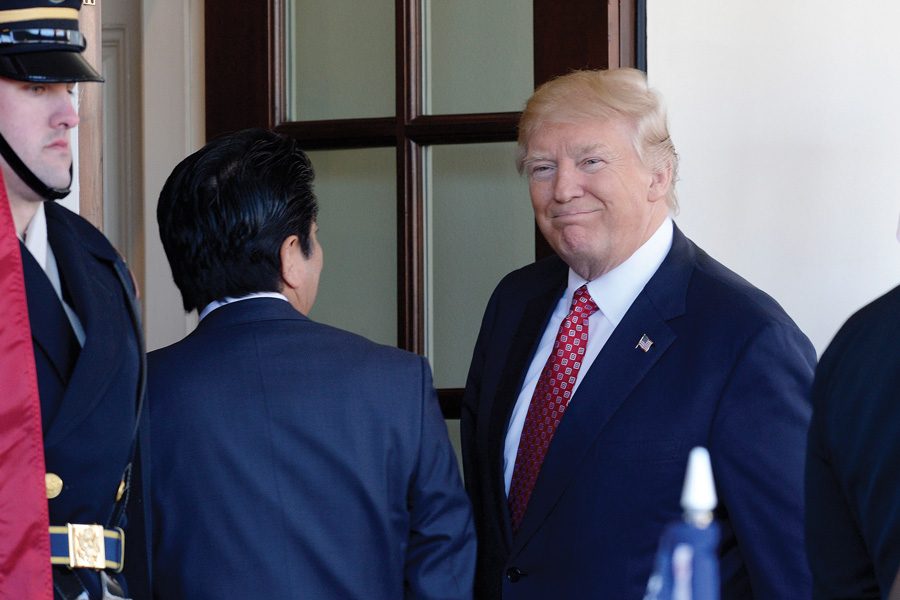Cook County Commissioners respond to Trump’s comments on Chicago
Olivier Douliery/Abaca Press/TNS
U.S. President Donald Trump welcomes Japanese Prime Minister Shinzo Abe at the White House on Feb. 10, 2017 in Washington, D.C. The Cook County Board of Commissioners passed a resolution this week asking the federal government for help in violence reduction efforts in Chicago.
February 13, 2017
The Cook County Board of Commissioners passed a resolution Wednesday requesting funds from the federal government to combat violence and social issues in Chicago.
The resolution comes in response to statements from President Donald Trump suggesting he will “send in the feds” to Chicago to end gun violence. In January both Mayor Rahm Emanuel and police superintendent Eddie Johnson responded to Trump’s tweets. Johnson said he is willing to work with the federal government to “boost federal prosecution rates for gun crimes in Chicago.” Emanuel echoed his sentiments but said National Guard assistance would not be welcomed.
However, commissioners clashed on the wording of the resolution, resulting in Trump’s name being removed from original legislation and being replaced by “the federal government.”
The original resolution, co-sponsored by commissioners Richard R. Boykin, Timothy Schneider and others at the Jan. 18 board meeting, served “as a formal request to President-elect Donald Trump to provide additional resources to fight the violence plaguing Chicago.”
Cook County Commissioner Larry Suffredin said he felt the original resolution was calling for “martial law” in Chicago in a continuation of Trump’s divisive rhetoric. Suffredin altered the language in the resolution from naming Trump to the federal government, and added information about Cook County’s dependence on the federal government for health care services and job training programs.
“Many folks wanted Trump to be the focus (of the resolution) and my position was this is not a monarchy,” Suffredin said. “We don’t talk to the president that way. We talk to the federal government that we already have programs with and we need them to be continued.”
Suffredin’s revisions also included requests that the government preserve and expand the Affordable Care Act and provide additional funds for Cook County hospital.
Boykin called Suffredin’s revision “insulting” and said he is playing political games with a “21st century genocide” occurring in Chicago. Boykin said he has been encouraged by the president’s willingness to help violence in the city and said politicians have shown throughout the past two years their inability to fix the problem.
Boykin said that while Suffredin’s bill did mention gun violence in Chicago, it wasn’t the sole purpose of the resolution like the one Boykin co-sponsored. Boykin said his bill was narrow as it related to the crime and violence that is taking place in certain communities.
Boykin’s original resolution was direct, he said, because it was specifically addressed to Trump and focused solely on violence in Cook County. He said the problem with the revised resolution is that there is no destination for the resolution within the federal government.
“I asked them, where did you guys send that resolution to?” Boykin said. “The federal government is a big monstrosity. It is a big entity. I guarantee you where they sent it to. They sent it to the garbage can.”
Email: [email protected]
Twitter: @samkrevlin


